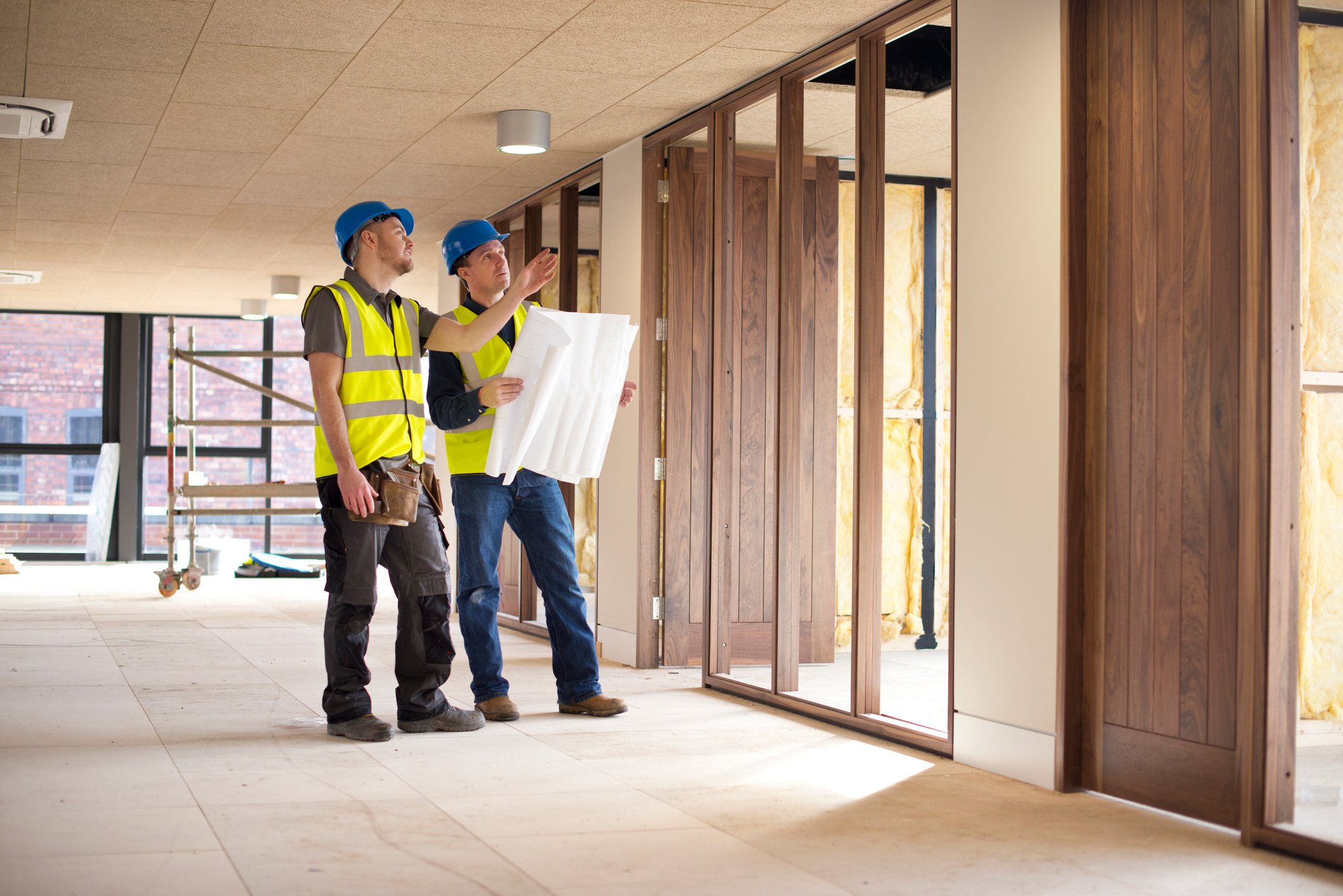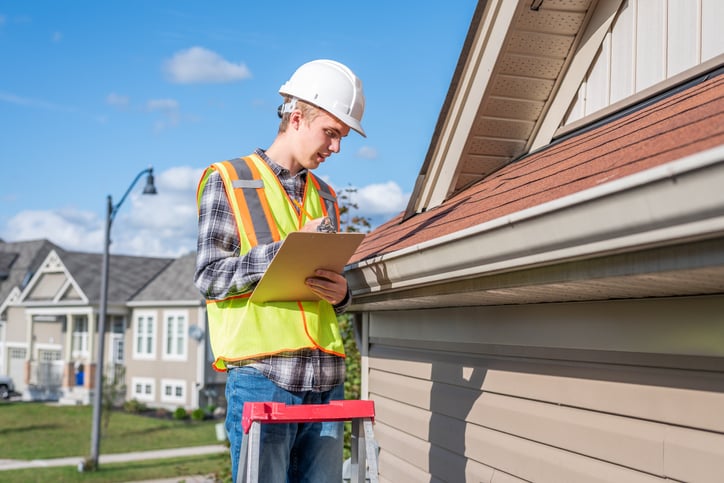
In construction, getting a project built is only half the race. Making sure it’s safe for humans to occupy upon completion is what brings a project across the finish line. That’s why we have construction and building inspectors. If you’re a strong communicator with an eye for detail, a firm grasp of construction principles, and a passion for health and safety enforcement, this may be the career you’re looking for.
Explore our full List of Careers in Construction!
Job Description: What Does a Construction and Building Inspector Do?
There are several different types of construction and building inspectors, and we’ll go into more detail on those in a moment. For now, we’ll give you a general idea of what the job entails.
Construction and building inspectors are concerned with how all the disparate elements of a building come together in a safe and healthy way. They offer vital oversight and regulatory knowledge from a project’s very beginning to its end. Most construction and building inspectors are government regulators tasked with enforcing building codes. Building codes are sets of laws that govern the standards by which structures are designed, built, and maintained to ensure the safety of human occupants. It’s an inspector’s job to be deeply knowledgeable of these codes, which cover every trade involved in a building’s construction. Updated every few years, the codes establish guidelines for everything from fire alarm and emergency exit placement, to plumbing and property maintenance, from the proper alignment of electrical sockets, to the correct width and angle of stairways. The specifics of the codes vary from one region to the next, meaning that what passes muster in one area may turn out to be a code violation in the next town over. Most jurisdictions in the US currently use some version of the International Building Code (IBC) developed by the International Code Council (ICC).
Like many regulators in the US, construction and building inspectors unfortunately don’t always get the most love, but they nevertheless play a vital role in ensuring that all of our built spaces are safe and serve as key resources for construction professionals throughout eyer stage of a project’s life cycle.
Construction and Building Inspector Salary and Job Outlook
Most inspectors can expect to make about $62,000 a year. This is the median or mid-range annual salary, according to the Bureau of Labor Statistics. As with any job however, the wages for inspectors fall on a spectrum and depend on a variety of factors, such as level of experience, state of employment, and which sector you work in. Inspectors on the low end of the pay scale earn about $38,000 while those on the high end can make more than $100,000 a year.
Here’s a snapshot of the average salaries in the states that pay inspectors the most:
- California: $91,510
- Alaska: $90,260
- Connecticut: $87,280
- District of Columbia: $87,190
- Washington: $79,310
As for job outlook, the BLS estimates that employment of inspectors will grow by about 3% between now and 2029. This is slightly below the 4% average growth rate projected for all other professions.
What Is the Difference between a Home Inspector and a Building Inspector?
We often use the term “construction and building inspector” in a general sense but it also encompasses several specialized subtypes. Some inspectors focus on the evaluation of a building’s plumbing, while others are certified to examine HVAC systems, and so on. Before we break down the different types, let’s take a look at two broad categories of construction and building inspectors, the ones we’re typically referring to when we use the general term.
A common question, for example, is “what is the difference between a home inspector and a building inspector?” Home inspectors, who (you guessed it) are focused on residential structures, are often self-employed, experienced construction professionals who provide visual examinations of houses, condominiums, and other types of residences to identify flaws in the interior, exterior, structural, and utility systems that may jeopardize the health and safety of the occupants.
Home inspectors then create reports of needed repairs, basing their analyses on the Standard of Practice, a set of guidelines created by the American Society of Home Inspectors’ (ASHI). Their reports do not determine market value, are not concerned with ferreting out and enforcing code violations (though they are knowledgeable of relevant codes), and are not determinative of anything in a “pass” or “fail” sense.

Rather, home inspections serve as assessment tools for use by the owner or prospective buyer of a home. Home inspections are usually reserved for when a house is about to be bought or sold, though the terms of some mortgages can require that a home inspection be done on a regular basis. You can find more information, training, and certification resources at the International Association of Certified Home Inspectors.
The second broad category is building inspectors, who are employed by municipal, city, state, and other governmental entities to enforce building codes. With these codes in mind, building inspectors review the plans for a construction project, examine work while it’s in progress, provide a comprehensive inspection upon completion, and conduct semi-annual inspections of the building moving forward. These inspections are done on residential, commercial, and public buildings. Building inspectors are similar to home inspectors in that they’re looking for the same thing: flaws in a building’s construction and upkeep that pose a threat to health and safety. Unlike home inspectors, however, building inspectors have the legal power to issue fines, enforce repair timelines, and even condemn a structure if deemed necessary.

Building inspectors are often specialized in particular areas of construction. Fire safety, energy efficiency, ADA accessibility—all of these are things that a building inspector can and should inspect for. Let’s take a closer look at a few of the most common specialized subtypes of building inspectors:
Fire Inspectors
Fire inspectors examine building plans and structures to ensure compliance with the best fire safety standards set by the International Fire Code and others. They check for ways a fire could potentially start in a building, what kinds of alarm systems are in place, and the modes of emergency ingress and egress. You can learn more about fire inspectors and how to become one at the National Fire Protection Association (NFPA).
Coating Inspectors
Coating inspectors ensure that the proper procedures have been followed when a spray, paint, or coating has been applied to a surface. Coatings may be needed to protect equipment and structures from weather, erosion, or chemical exposure. You can learn more about coating inspectors and how to become one at NACE International.
Electrical Inspectors
Electrical inspectors examine wiring plans, electrical systems, and components to ensure safety and compliance with the National Electrical Code. Electrical inspectors look for faulty wiring, frayed wires, and other electrical hazards that could lead to personal harm or an electrical fire. It’s worth noting that new-to-world innovations, like digital torque wrenches with reporting functionality can help provide inspectors with proof that connections were made and installations were performed to spec.
You can learn more about electrical inspectors and how to become one at the International Association of Electrical Inspectors.
Elevator Inspectors
Elevator inspectors are responsible for ensuring that elevators, escalators, moving sidewalks, and other lift or mechanical conveyance machinery are safe for use by humans. You can learn more about elevator inspectors and how to become one at the National Association of Elevator Safety Authorities International.
Plumbing Inspectors
Plumbing inspectors examine a building’s piping systems, water storage, drains, and plumbing fixtures to ensure safe drinking water and sanitary water disposal. You can learn more about plumbing inspectors and how to become one at the International Association of Plumbing and Mechanical Officials.
Mechanical Inspectors
Mechanical inspectors are responsible for ensuring that a building’s heating, ventilation, air conditioning, and refrigeration (HVACR) systems and associated appliances are all functioning safely and in compliance with code. Whereas a plumbing inspector is concerned with water pipes, a mechanical inspector is concerned with any pipes or systems that gas flows through. You can learn more about mechanical inspectors and how to become one at the International Association of Plumbing and Mechanical Officials.
Public Works Inspectors
Public works inspectors are responsible for evaluating the quality of large- scale public infrastructure projects, be they local, state, or federal: Bridges, dams, sewers, roads, and highway systems are a few examples. One of the main concerns of a public works inspector is the proper laying of concrete. You can learn more about public works inspectors and how to become one at the American Public Works Association.
What Kind of Education and Skills Does a Construction and Building Inspector Need?
Like many occupations in the world of construction, only a high school diploma is needed to become a construction and building inspector—no four- year college degree required.
That said, it’s a crowded job market out there and any edge you can get on the competition could be the thing that makes all the difference. Some employers may prefer candidates with an amount of postsecondary education. Depending on what state you live in, you may also need to acquire licensing or certification before you’re allowed to work as a building inspector. Certifications can be earned at many community colleges, which offer other construction related courses such as drafting that are relevant to the job of an inspector. If you’re planning on going the self-employed route, it may also be wise to take some business or accounting courses while you’re at it.
As far as job skills, one of the most important a construction and building inspector must possess is strong communication, both verbal and written. There’s not a lot of room for error or ambiguity when a building’s fire safety hangs in the balance. It takes great prowess to be able to speak and write clearly about the technical jargon of building codes in such a way that leads to positive forward action. Along those lines, people skills are also critically important. Inspectors need to be able to relate to their clients in a way that doesn’t sew confusion or mistrust. They need to be patient, adept at defusing and resolving conflicts, and have the ability to persuade and teach others the proper way of doing things. Indeed, whether a construction professional views an inspector as friend or foe often hinges on the strength and clarity of the inspector’s communication and interpersonal skills.
The job also requires a high degree of technical knowledge. Measurements. Soil composition. Climatological dynamics. The strength of steel, concrete, and other construction materials—these are just a few examples of the foundational construction principles that any building inspector, no matter their specialty, must possess. Construction and building inspectors also need an eye for fine detail. They need to be able to notice things that others might miss and be able to quickly assimilate those details into the bigger picture.
What Does the Future Hold for Construction and Building Inspectors?
Speaking of the bigger picture, new trends and advances in technology are having an increasingly transformative impact on how construction and building inspectors do their jobs.
Construction drones are making it possible for inspectors to more safely examine dangerous or hard-to-reach areas of construction sites. Rather than risk a potentially deadly climb up a rickety scaffolding to inspect a steel beam, an inspector can now keep both feet on the ground and send a construction drone instead. These highly maneuverable unmanned aerial vehicles (UAVs) are outfitted with high definition and multi-spectral cameras, which, in addition to increasing safety, give inspectors heightened abilities to detect anomalies or flaws. Building inspection software has also made the job easier and more efficient than ever. Accessible on mobile devices, software allows inspectors to eliminate paperwork, capture photos and videos during walkthroughs, and share reports across multiple platforms.
Meanwhile, changes in the climatological and political landscapes are poised to leave a lasting mark on how inspections are done in the future. Building inspectors in California, Illinois, and many other states have had to quickly learn how to apply existing building codes to new sites like cannabis facilities as marijuana and other controlled substances become legal across the US. This is just a snapshot of how building inspectors need to be able to ride the current as changes in the law create ripple effects downstream.
With sustainable construction trending upward, new inspection specialities may need to be created or old ones updated, as many of the buildings of tomorrow will be made with eco-friendly materials and integrated with renewable energy solutions like geothermal heating and cooling, as well as wind and solar power capabilities. Extreme weather events brought on by climate change may also affect the standards by which buildings are constructed from one region to the next, with some requiring greater flood readiness and others enhanced wildfire preparedness.
In a nutshell, building codes and the inspectors who enforce them will need to adapt to the changing climate, our society’s adoption of sustainable building practices, and new laws like the legalization of marijuana. Thankfully, new tools like inspection software and construction drones are making the job easier than ever, though inspectors will still need to rely on their knowledge and communication skills above all else. Whatever the future may bring, construction and building inspectors of all specialties will remain critical to ensuring the health and safety of our buildings.